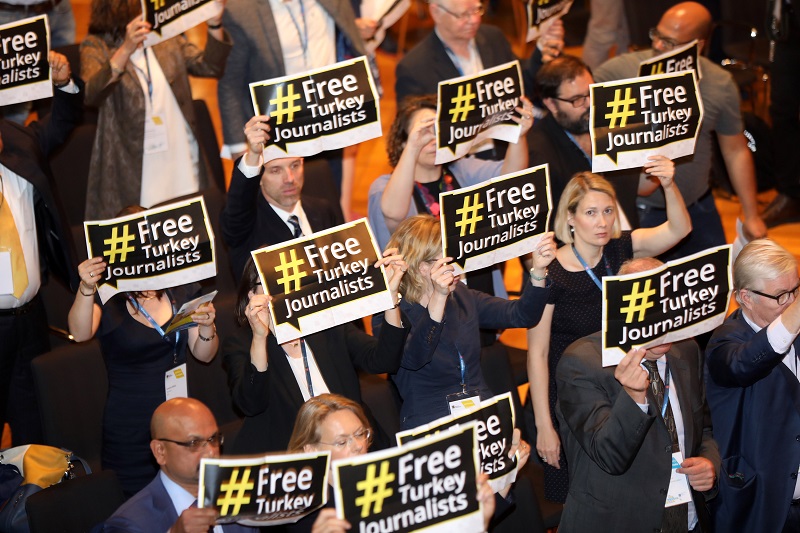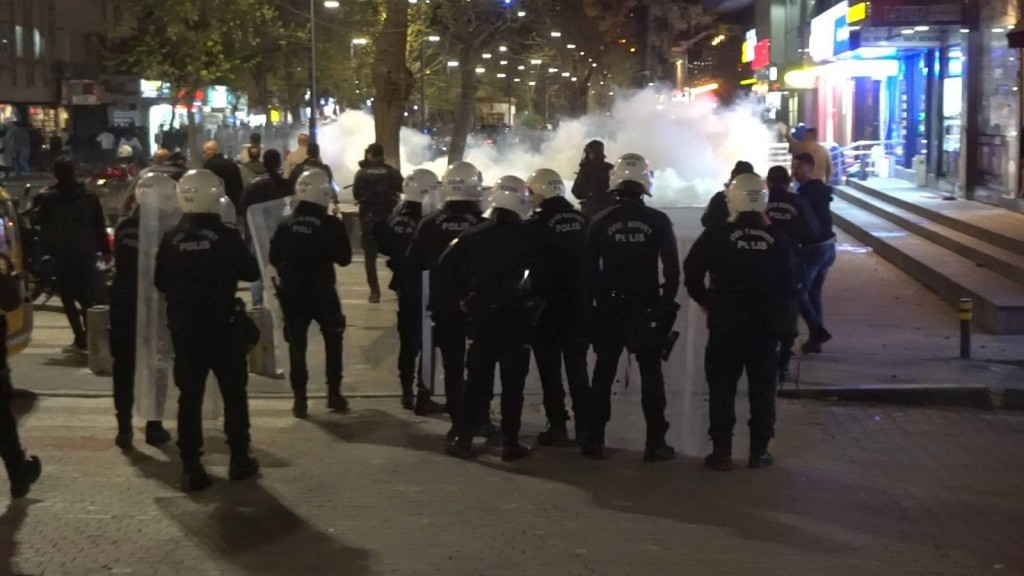The call came during an opening ceremony at Hamburg’s historic City Hall for the Congress, which from May 18 to 20 will bring over 300 leading media representatives and their guests from some 45 countries to discuss how to meet the challenges quality journalism faces today.
Olaf Scholz, first mayor of Hamburg, welcomed Congress participants and stressed the importance of a free media for democracies, emphasising that “efforts to limit press freedom and impede the work of journalists always indicate a turning away from democratic modes of governing”.
Referring to Turkey, he reiterated demands by Germany’s president that Turkey’s government “respect the rule of law and the freedom of the media and journalists” and that it immediately release German-Turkish journalist Deniz Yücel, German journalist Meşale Tolu and all other journalists jailed in Turkey due to their work.
Turning to current discussions on “false information” and “fake news stories,” Scholz called for a “re-focussing on facts and objective reporting.” Fact-checking, he noted, is “expensive and hard”, but “therein lies the great achievement of journalists”.
Carl-Eugen Eberle, chair of IPI’s German National Committee and a former chair of IPI’s Executive Board, also spoke of the “media’s role in building inclusive societies and fostering democracy”.
Eberle recalled that it had been nearly 20 years since the last IPI World Congress in Germany, held in Berlin, when the country was on the eve of reunification and Perestroika had brought reforms to the Soviet Union and the countries of Eastern Europe.
However, he observed, “hopes for a better world of stable democracies based on free press and independent media … have only partially been fulfilled”.
Eberle continued: “Press freedom in a number of Eastern European and former Soviet states is under threat. The prosecution and jailing of journalists in Turkey seems to have no end. Moreover, new and dangerous developments are undermining the important and significant role that traditional media play in democratic systems.”
He also read aloud a letter from German Minister of State for Culture and the Media Monika Grütters that was given to an IPI delegation that travelled to Berlin on Wednesday to meet with government officials. She wrote that Germany “cannot stand by and watch close allies riding roughshod over democratic fundamental rights” and she made a “promise that Germany’s Federal Government will continue to firmly support the freedom of the press and the release of imprisoned journalists worldwide”.
IPI Executive Director Barbara Trionfi said in an address that Congress participants in the following two days would “discuss the challenges and the obstacles that journalism faces, the struggle for quality and independence, which for many has become a struggle for survival, and the need for solidarity with journalists persecuted anywhere”.
She noted that one of these “brave journalists,” IPI Executive Board Member and Cumhuriyet columnist Kadri Gürsel, who has spent over 200 days in pre-trial detention on trumped up charges of supporting terrorism, “should be sitting here, in the first row, together with his fellow IPI Executive Board members”.
Gürsel is one of more than 160 journalists and media workers imprisoned in Turkey on what Trionfi told the audience were “absurd accusations … often based on their news coverage or criticism of the government”.
Speaking for IPI’s worldwide network, she continued: “We stand behind Kadri, and others like [IPI members] Murat Sabuncu and Ahmet Şik, and every other journalist behind bars in Turkey for his or her work.”
Trionfi then introduced Gürsel’s wife, Nazire Kalkan Gürsel, who shared a letter from her imprisoned husband.
“I know that the real crime that I committed was criticizing the Turkish government’s domestic and foreign policies, as well as its oppressive practices, strongly and efficiently,” he wrote from the 9th Block of Turkey’s high-security Silivri prison. “Journalism in Turkey has been criminalised once again with the arrest of myself and my friends in a move to intimidate the journalists who still dare to remain independent and critical.”
Participants closed the opening ceremony with a display of solidarity for their imprisoned colleagues, holding up signs calling on Turkey to #FreeTurkeyJournalists.



